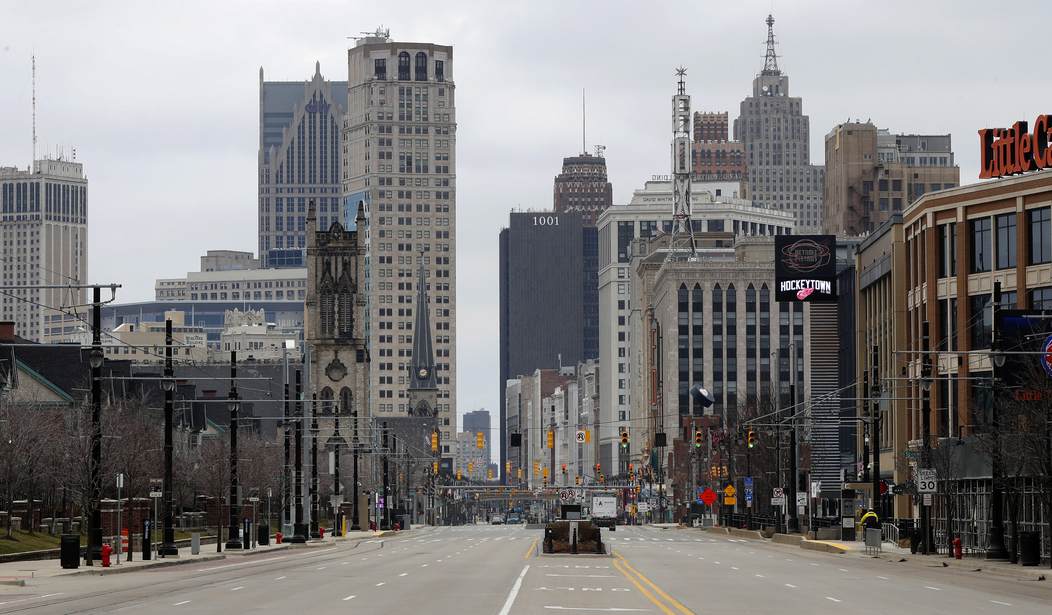Like many U.S. cities, Detroit's homicide rate plunged in 2023. The city recorded the fewest homicides since 1966; a major achievement even taking into account the fact that the city's population has fallen by more than 50% during the past six decades.
Over at Vox, reporter Marin Cogan has done a deep dive on the policies and practices implemented in the Motor City that have helped make Detroit a safer place, and while she gives credit to everything from partnering mental health workers with police officers to community violence interruption grants, there's one phrase that's missing from her investigation: gun control.
Michigan Democrats, emboldened after the 2022 elections gave them complete control of state government, adopted several new restrictions on lawful gun owners last year, but neither Cogan nor any of the folks she interviewed for her story ever mentioned gun control as a factor in Detroit's declining number of homicides. Cogan did pin some of the blame for Detroit's surge in violence in 2021 on "a country awash in too many guns," but it's not like those guns disappeared over the past two years, and she certainly didn't credit gun control efforts for Detroit's success in combatting homicides.
The decrease, meanwhile, may have much to do with society reopening and stabilizing, but it also probably has something to do with changes to the way some police, prosecutors, and civic leaders — in Detroit and elsewhere — have been operating after the major challenges of 2020.
For Detroit, what worked was a coordinated effort across multiple agencies and community organizations that was targeted at reducing and preventing gun crime and mobilizing the judicial system after a pandemic-era shutdown seriously hampered the courts.
Cogan asserts that "it wasn’t the “tough on crime” approach that so many leaders are now pursuing" that led to the reduction in homicides, but that's not exactly true. What the city has done is target law enforcement resources on both individuals who at risk of committing violence and the circumstances where violence might erupt, while also engaging in broader efforts to increase community involvement and cooperation with police.
The city also unveiled a 12-point “summer surge” plan that increased police presence, curfew enforcement, and strategic traffic restrictions to secure downtown Detroit following the murder of a security guard last year. Police also cracked down on drag racing and stepped up their presence at community events where they had reason to believe there might be a risk of gun violence.
... Courts across the country shut down because of Covid-19, delaying trials and preventing felony charges from moving through the adjudication process.
To get the system moving again and to reduce the backlog of felony gun cases, district and circuit courts moved to get more hearings on the calendar. The US attorney for Eastern Michigan, Dawn Ison, also partnered with federal agencies to prosecute gun crimes and take illegal weapons off the street.
Detroit received $826 million through the American Rescue Plan Act in 2021, and in 2023, the city allocated a small slice of the money to a handful of community-based programs working to reduce gun violence in the neighborhoods that suffered from it the most. One of those programs is FORCE Detroit, which works on the west side of Detroit in a neighborhood that saw a significant reduction in gun violence last year.
“Our goal is to create peace, so we’re dealing with people on multiple sides of conflict,” says Harvey-Quinn, the group’s founder. “They understand that our space is a neutral zone.”
... “We’re working with the people who shoot guns, and we’re encouraging them not to,” Harvey-Quinn says.
“Statistically, less than 2 percent of our community is ever going to shoot a gun.” By designing programs focused on meeting that 2 percent in their own neighborhoods, she says, “you have a real opportunity to deeply impact them. It really matters whether or not they get the good, wraparound services. It really matters that they have mentors that care.”
Getting tough on crime doesn't mean passing a ton of new laws or making tens of thousands of arrests on minor charges. It means going after the individuals who are committing these violent acts. Saddling lawful gun owners with more restrictions that infringe on their Second Amendment rights is the wrong approach. As Harvey-Quinn points out, less than 2 percent of Detroit's population is ever going to use a gun in the commission of a crime, so why would anyone think that smothering the Second Amendment rights of the 98% is going to have a positive effect?
For many gun control advocates, crime is just a handy excuse to push for policies that are meant to curb gun ownership altogether, and the more folks believe that crime is out of control, the better it is for their anti-gun agenda. Detroit is just the latest example of a city significantly reducing violent crime without significantly reducing gun ownership; proof positive that we can make cities safer places without making residents less free.










